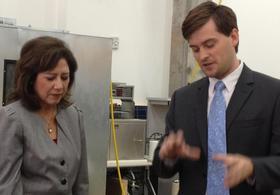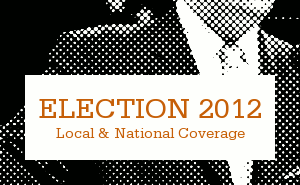
Nearly $147 million dollars in federal grants will be given to develop and expand strategies to help Americans return to work in fields that are currently hurting for workers. Secretary of Labor Hilda Solis visited Carnegie Mellon University to announce the funding, and to tour the university’s Planetary Robotics Lab.
“There’s so many great applications that I saw demonstrated, whether it’s robotics, health care, education — oh my God. I’m just amazed,” said Solis, after talking with several CMU innovators who showcased things such as therapy robots, a new adhesive, and a moon rover.
26 grantees across the U.S. will receive grants for pioneering workforce training models.
“This includes an award of $3 million to the Three Rivers Work Force Investment Board, and that is to be given in Allegheny County to create a new apprenticeship model called ‘Making It in America,’” said Solis.
The effort will involve collaboration between unions, startups, industry leaders and workforce development professionals and universities. The goal is to help innovators in the earliest stages of product development to start thinking about all aspects of building a manufacturing operation, including a workforce. Solis said the ultimate goal is to, once again, start producing more goods in the U.S.
“The president and I strongly believe we can take that step, where we can produce things here again and that we can also begin to export those items, and things I saw here have so much applicability everywhere, and I know there will be markets,” said Solis.
But the key is making sure workers are trained for jobs. It’s estimated there are some 40,000 jobs in the region going unfilled because people don’t have the right qualifications. Solis said training doesn’t necessarily mean a four-year college degree. It could be apprenticeship and other programs as well. But, Solis said, training can’t happen unless there is investment for such programs.
“We have to send our limited resources to where they will do the most good, places like right here in Pittsburgh,” she said, adding that programs such as Making It in America help solidify the American Dream, “anything can be done and we are unstoppable.”
Another $20 million was also announced, that will go toward a second round of grants through the so-called Workforce Innovation Fund to help encourage a “pay for success” approach to workforce development. Under that model, the public and private sector will partner to invest in programs they believe are effective, and will be paid based on whether they deliver results.






